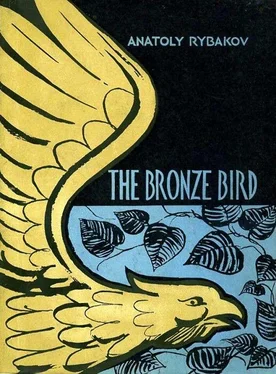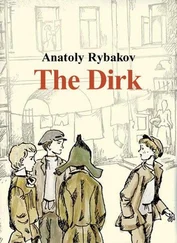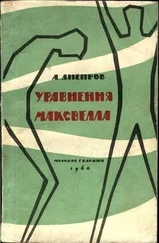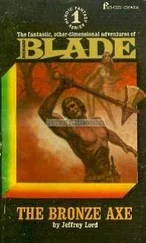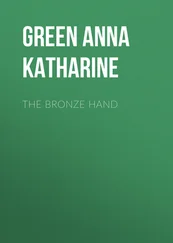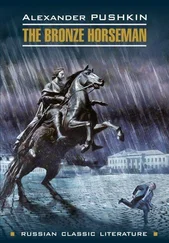Anatoly Rybakov - THE BRONZE BIRD
Здесь есть возможность читать онлайн «Anatoly Rybakov - THE BRONZE BIRD» весь текст электронной книги совершенно бесплатно (целиком полную версию без сокращений). В некоторых случаях можно слушать аудио, скачать через торрент в формате fb2 и присутствует краткое содержание. Город: Moscow, Год выпуска: 1956, Издательство: Foreign Languages Publishing House, Жанр: Детские приключения, Детектив, Исторические приключения, на английском языке. Описание произведения, (предисловие) а так же отзывы посетителей доступны на портале библиотеки ЛибКат.
- Название:THE BRONZE BIRD
- Автор:
- Издательство:Foreign Languages Publishing House
- Жанр:
- Год:1956
- Город:Moscow
- ISBN:нет данных
- Рейтинг книги:5 / 5. Голосов: 1
-
Избранное:Добавить в избранное
- Отзывы:
-
Ваша оценка:
- 100
- 1
- 2
- 3
- 4
- 5
THE BRONZE BIRD: краткое содержание, описание и аннотация
Предлагаем к чтению аннотацию, описание, краткое содержание или предисловие (зависит от того, что написал сам автор книги «THE BRONZE BIRD»). Если вы не нашли необходимую информацию о книге — напишите в комментариях, мы постараемся отыскать её.
THE BRONZE BIRD — читать онлайн бесплатно полную книгу (весь текст) целиком
Ниже представлен текст книги, разбитый по страницам. Система сохранения места последней прочитанной страницы, позволяет с удобством читать онлайн бесплатно книгу «THE BRONZE BIRD», без необходимости каждый раз заново искать на чём Вы остановились. Поставьте закладку, и сможете в любой момент перейти на страницу, на которой закончили чтение.
Интервал:
Закладка:
"I'm not saying I won't go," Longshanks said, "but I won't go further than the brushwood road. That's as far as I'll go."
"That's fine. You get us there, we'll do the rest ourselves."
"Who else is going?"
"Genka. Only don't tell anybody."
"Why should I?"
"Not even your mother, understand?"
"Yes."
"We'll go tonight."
"Tonight?"
"Why put it off? Be at the camp in the evening. We'll start out as soon as everybody is asleep."
"All right, I'll be there," Longshanks promised and returned to his chores.
Chapter 38
SLAVA'S INVESTIGATIONS
Slava returned from Moscow late in the afternoon. "The counts Karagayev," he said, "were related to the famous Demidov family. There lived in Tula a blacksmith named Demid Antufyev. His son was gunsmith to Peter the Great. For that, Peter gave him concessions in the Urals, raised him to the rank of the nobility and gave him the name of Demidov. The daughter of one of the Demidovs married Count Karagayev."
"Who's interested in that?" Genka said, making a face. "Shut up and listen. The Demidovs were the richest family in Russia. Even princesses were given in marriage to them. Anatoly Demidov married one of Napoleon's nieces." "You're stretching it there."
"I swear I'm not. To be equal to the honour, Anatoly Demidov bought the principality of San Donato in Italy and came to be called the prince of San Donato."
This was something even Misha could not believe, although he knew that flights of fancy were not a weakness of Slava's. But there was the possibility it was the invention of some author and Slava was now passing it on as authentic data. How could a person buy a whole principality, a kingdom, one might say? But Slava insisted on this.
"If you don't believe me," he said in an offended tone of voice, "go to the Urals. You'll find a railway station called San Donate."
"You needn't feel sore about it."
"I'm not. But if you had spent a whole day at the Rumyantsev Library in this heat, you'd also feel hurt."
"All right, go on with the story," Misha said in a placating tone.
"Well then. The Demidovs were very rich. They owned factories and mines in the Urals. And they were terrific cranks. One of them, Prokofy, for example, threw a party in Petersburg at which there was such hard drinking that five hundred people died."
"Another tall story!" Genka squealed and slapped his knees.
"It's the truth. While on a visit in England, this Prokofy took offence at something. He went back to Russia and bought up all the hemp so that the English would not get it. Hemp was their main item of import from Russia, and in this way he taught them a lesson."
"On his own money."
"What was money to him? There was another Demidov, Pavel, who in 1835 gave Nicholas I a diamond worth exactly half a million roubles."
"He must have been a famous toady," Misha noted.
"A little stone and worth half a million roubles in gold?" Genka said, voicing his disbelief again. "A bit too expensive that!"
"Yes, half a million," Slava continued. "It was the famous Sansy diamond and it has an interesting history. It was brought from India about five hundred years ago and belonged to Charles the Bold, Duke of Burgundy. Charles was killed in battle and the diamond was picked up by a Swiss soldier. The soldier did not know what the diamond was worth, thought it was simply a beautiful stone and sold it to a priest for one guilder, one rouble, in other words. This priest was no fool and sold the diamond to Antonio of Portugal. Besides being a king, Antonio was also an astute businessman and unloaded the diamond for a hundred thousand francs on the French Marquis de Sansy. Since then it has been known as the Sansy diamond. Now listen to what happened after that. Sansy's servant, who was taking the diamond to his master, was attacked and killed by robbers. But before he was killed, he swallowed the diamond. Sansy had the corpse opened and found the diamond in the stomach."
"A merry story!" Genka noted, putting his hands on his stomach and feeling it.
"After that," Slava went on, "kings began to profiteer with the diamond again. Sansy sold it to James II of England, James II sold it to the French king Louis XIV, then it passed on to Louis XV. It was sold and resold many times until finally Pavel Demidov bought it as a present for Nicholas I in 1835. That's the story of the diamond."
The boys fell silent. Then Misha said:
"I can see that you did some serious study. But how does this tie up with the estate?"
"By the fact that one of the Demidov girls married Karagayev."
"Well, what of it?"
"The Sansy diamond may have been part of her dowry."
"But you've just told us that Demidov gave the diamond to Nicholas I."
"He might have given him an imitation. In those days, you must remember, everything was based on fraud."
Genka whistled.
"You're wrong there. Nobody ever pulled a fast one on Nicholas I and his Benkendorf."
"You see, Slava," Misha said, "of course, it is difficult to suppose that the diamond found its way to the count. But let's assume that that was the case. What does it show?"
"Don't you see?" Slava said, feeling hurt. "Quite possibly, it is what the men are looking for. Everybody says that people have been looking for buried treasure in these parts for years. Perhaps they're hunting for treasure now as well."
"Perhaps," Misha agreed. "And that only shows that we have to go to the woods. Whether it is for this stone or not, it is a fact that they're looking for something. And when people look for treasure they don't stop at murder. For us it is important to find out who killed Kuzmin and thereby prove Nikolai's innocence."
"I wasn't objecting. I only told you what they are looking for."
"Well, that's fine," Misha said. "That means we're going to the woods tonight."
Chapter 39
THE CAMP-FIRE
Naturally, it was impossible to conceal their plans from the rest of the troop. But everybody was aware that this was more than a secret: if it reached the boatman that Misha, Genka and Longshanks were going to the woods he might follow and kill them. He and those men of his were quite capable of that. Hadn't they killed Kuzmin?
The expression on the faces of all the youngsters was at once grave, mysterious and even a little solemn. It was the kind of expression people wear when they are faced with an important and, especially, dangerous undertaking. The troop comported themselves at their best and everybody endeavoured to please Misha and Genka, for nobody knew in what shape they would return or whether they would return at all. Misha grew so tired of their pitying glances that he went to the riverside and sat in his favourite spot. He liked to sit there in the evenings and watch the flaming sun set behind the distant hills.
Moreover, Misha had another secret, a tiny secret that belonged to him alone: he wrote poetry.
It was something he had started recently. At one time he thought poetry was a frivolous occupation. It was different when it was written by real poets, say Pushkin, Lermontov or Nekrasov. Or by modern poets like Mayakovsky and Bezymensky. That was real poetry. What youngsters wrote was nothing but rhymed words, and badly rhymed at that. Misha's attitude to school poets had always been one of irony. It was a different thing when poetry was written for the wall newspaper or to commemorate a famous date, for the wall newspaper could do without poetry. He appreciated the need for popular verse for the Blue Blouse-it sharpened criticism of shortcomings. But he could not stand "mood" poetry, just as he could not stand the "moods" themselves.
Morally unstable chaps, who kept away from social life, usually had "moods." As a matter of fact, you got cases of "moods" among Komsomols as well, but they were rare. A fellow with a "mood" went about looking sad and dispirited, with a hangdog air about him. He looks at everything sceptically and everything he sees seems petty, insignificant and uninteresting. To such a fellow even life itself does not seem to be worth while living. His speech is full of philosophical sayings like "life is short and dull," "everything is transient," "everything repeats itself," and "we've got to take all life can give us." On the whole, all that was stuff and nonsense. Such a "despondent" usually talked about loneliness, about people never understanding him and recited decadent verses. Besides, he wrote decadent verses himself-about the world being enigmatic, about the transience of life and other things of the same sort.
Читать дальшеИнтервал:
Закладка:
Похожие книги на «THE BRONZE BIRD»
Представляем Вашему вниманию похожие книги на «THE BRONZE BIRD» списком для выбора. Мы отобрали схожую по названию и смыслу литературу в надежде предоставить читателям больше вариантов отыскать новые, интересные, ещё непрочитанные произведения.
Обсуждение, отзывы о книге «THE BRONZE BIRD» и просто собственные мнения читателей. Оставьте ваши комментарии, напишите, что Вы думаете о произведении, его смысле или главных героях. Укажите что конкретно понравилось, а что нет, и почему Вы так считаете.
